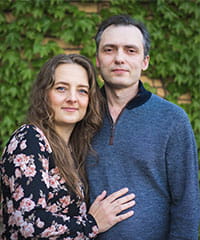Vadim and Tatiana’s family, which includes the couple and their six children, is tightknit – the two work tirelessly to provide for them. Yet supporting their family became difficult when Vadim, who works as a carpenter, was diagnosed with cirrhosis, or scarring of the liver, in 2018.
Doctors diagnosed Vadim with cirrhosis after a trip to the emergency department due to an enlarged and swollen abdomen.
“We were in shock,” Tatiana said. “He didn’t have any other symptoms; his belly was just swollen. He never smoked or drank alcohol. His diagnosis was a big surprise for us.”
The Condition: Cirrhosis
Vadim’s swollen abdomen was the result of ascites, or buildup of fluid in the abdominal cavity. More than 50% of people with cirrhosis develop ascites.
One of the liver’s primary functions is to filter blood from the digestive tract. Scarring of the liver makes it hard for the organ to perform this function, which causes pressure to build up in nearby blood vessels.
As the pressure builds, so does the fluid that a healthy liver would typically filter. When the liver is unable to filter this fluid, it moves to other parts of the body and often collects in the abdominal cavity, ultimately causing painful swelling like Vadim experienced.
The Path to the UPMC Liver Transplant Program
After his trip to the emergency department and diagnosis, Vadim was referred to Kapil Brijmohan Chopra, MD, a transplant hepatologist and gastroenterologist who serves as vice chair of medicine at UPMC Mercy. Dr. Chopra treated Vadim’s ascites and discussed the possibility of a liver transplant with the couple.
From 2018 to 2022, doctors routinely removed the fluid from his stomach through paracentesis. This minimally invasive procedure involves using a needle to drain or vacuum the fluid out of the stomach. Vadim was also prescribed diuretics, or water pills, to help with the fluid buildup.
Yet as time went on, Vadim needed the fluid drained more often. His model for end-stage liver disease (MELD) score, which measures how urgently someone needs a liver transplant, continued to increase. He continued his full-time job as a carpenter and was constantly fatigued.
Vadim was eventually added to the liver transplant waiting list. Liver transplant is a treatment option for chronic liver conditions like cirrhosis.
Dr. Chopra informed the couple about living-donor liver transplant, a first-line treatment option which involves a person donating a portion of their healthy liver to someone with end-stage liver disease. Living donation has several benefits for those who qualify, including less time on the waiting list and a quicker recovery.
After Vadim was referred for living donation, the next step was to find potential living-liver donors. Tatiana offered to be evaluated without hesitation.
“I just couldn’t watch Vadim in his condition any longer,” Tatiana says. “I love him so much; he cares about his family so much. He adores his kids, and I can’t imagine my life without him.”
The Result: A Remarkable Difference
Vadim and Tatiana both underwent a thorough evaluation at UPMC. She was a match to donate a portion of her liver to her husband.
“I remember the phone call from my coordinator. I couldn’t believe that I was a match – I was shocked but glad, and also a little nervous,” Tatiana says. “The transplant team at UPMC made it so easy. The whole process was so smooth and organized.”
Vadim and Tatiana underwent their living-donor liver transplant in August 2022, performed by Abhinav Humar, MD, chief, UPMC Transplant Services; and Christopher Hughes, MD, surgical director, UPMC Liver Transplant Program. Tatiana remembers seeing an immediate difference in Vadim’s condition.
“The next day after the surgery, his skin wasn’t yellow or brown; his eyes were so bright,” Tatiana says. “Even our daughter realized these differences right after the surgery. It was amazing.”
Vadim’s other symptoms subsided as well, such as stomach cramps, muscle contractions, and a lack of appetite. His energy levels have also improved.
Vadim and Tatiana have both recovered well since the surgery. Overall, the couple is incredibly grateful for the care they received at UPMC.
“We feel very blessed and really appreciate what UPMC has done for us,” Tatiana says. “I’m just so happy that we had this opportunity.”
Vadim and Tatiana’s treatment and results may not be representative of all similar cases.

















